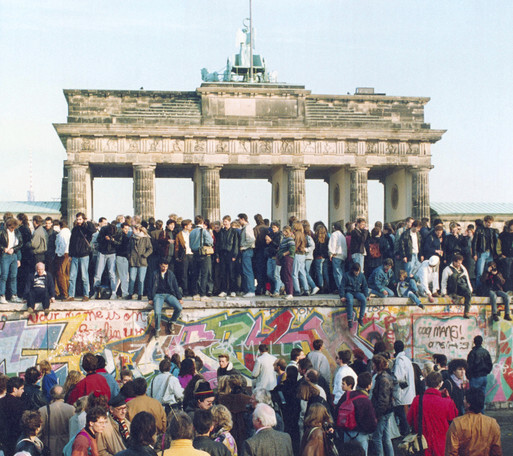hankyoreh
Links to other country sites 다른 나라 사이트 링크
[Editorial] We need to learn from Germany’s unification 30 years ago

The Berlin Wall, a symbol of the Cold War between the Capitalist and Communist worlds, fell on Nov. 9, 1989. Not long afterward, West and East Germany savored the joy of unification, and the Communist regimes of Eastern Europe tumbled down one after another. In just two years, the Soviet Union collapsed as well, making the Cold War a legacy of the past.
Thirty years have passed since the epochal turning point known as the end of the Cold War. It’s frustrating to think that, despite all those changes, the Korean Peninsula still remains the last lonely bastion of the Cold War. We hope that South and North Korea will work together to move beyond the Cold War legacy of confrontation and to open a path to cooperation and reconciliation.
According to reports in the foreign press, those who were present when the Berlin Wall came down remember it as a “surprising and exhilarating experience” and as “completely unexpected.” Wim Wenders, West German director of “Wings of Desire,” recalls that when he first heard that the wall had fallen, he thought that Soviet tanks were rolling across the border.
But it’s widely agreed that the actual fall of the Berlin Wall was the result of West Germany’s consistent and bilateral pursuit of reconciliation, exchange, and cooperation with East Germany, regardless of which party was in power, following the declaration of “Ostpolitik” by West German Chancellor Willy Brandt in 1969. This has important implications for South Korean politics, in which North Korean policy tends to swing like a pendulum between reconciliation and confrontation, depending on whether a progressive or conservative government is in power.
Germany’s reunification did not make everybody happy. The Hankyoreh’s interview with Steffen Mau, a professor at Humboldt University, shows that West and East Germany still have a long way to go before they can overcome their disparity and division and be fully integrated. West Germany has a clear political and economic advantage, while East Germany faces rampant unemployment, low wages, and disgruntlement. Institutional unification is no guarantee of social integration.
If unification occurs before we are ready, it could create new problems. Taking German unification as an example, we need to work on drafting a blueprint about how to achieve inter-Korean reconciliation, exchange, cooperation, and social integration through social consensus.
Please direct comments or questions to [english@hani.co.kr]

Editorial・opinion
![[Column] Season 2 of special prosecutor probe may be coming to Korea soon [Column] Season 2 of special prosecutor probe may be coming to Korea soon](https://flexible.img.hani.co.kr/flexible/normal/500/300/imgdb/original/2024/0426/3317141030699447.jpg) [Column] Season 2 of special prosecutor probe may be coming to Korea soon
[Column] Season 2 of special prosecutor probe may be coming to Korea soon![[Column] Park Geun-hye déjà vu in Yoon Suk-yeol [Column] Park Geun-hye déjà vu in Yoon Suk-yeol](https://flexible.img.hani.co.kr/flexible/normal/500/300/imgdb/original/2024/0424/651713945113788.jpg) [Column] Park Geun-hye déjà vu in Yoon Suk-yeol
[Column] Park Geun-hye déjà vu in Yoon Suk-yeol- [Editorial] New weight of N. Korea’s nuclear threats makes dialogue all the more urgent
- [Guest essay] The real reason Korea’s new right wants to dub Rhee a founding father
- [Column] ‘Choson’: Is it time we start referring to N. Korea in its own terms?
- [Editorial] Japan’s rewriting of history with Korea has gone too far
- [Column] The president’s questionable capacity for dialogue
- [Column] Are chaebol firms just pizza pies for families to divvy up as they please?
- [Column] Has Korea, too, crossed the Rubicon on China?
- [Correspondent’s column] In Japan’s alliance with US, echoes of its past alliances with UK
Most viewed articles
- 1‘We must say no’: Seoul defense chief on Korean, USFK involvement in hypothetical Taiwan crisis
- 2Why Kim Jong-un is scrapping the term ‘Day of the Sun’ and toning down fanfare for predecessors
- 3Two factors that’ll decide if Korea’s economy keeps on its upward trend
- 4After election rout, Yoon’s left with 3 choices for dealing with the opposition
- 5BTS says it wants to continue to “speak out against anti-Asian hate”
- 6AI is catching up with humans at a ‘shocking’ rate
- 7Noting shared ‘values,’ Korea hints at passport-free travel with Japan
- 8Gangnam murderer says he killed “because women have always ignored me”
- 9South Korea officially an aged society just 17 years after becoming aging society
- 10Ethnic Koreans in Japan's Utoro village wait for Seoul's help